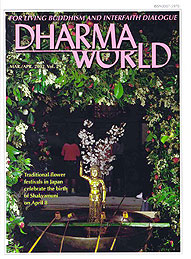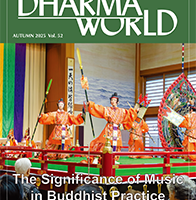March-April 2002, Volume 29(PDF)
Celebration of the Anniversary of Shakyamuni’s Birth
Reflections
Ridding Ourselves of the Defilements by Nikkyo Niwano
This essay is part of an ongoing series of translations from a recent volume of inspirational writings by the late founder of Rissho Kosei-kai. Dharma World will continue to publish these essays because of their permanent value as guidance for the practice of one’s faith in daily life.
Nikkyo Niwano, the late founder of the Buddhist association Rissho Kosei-kai, was an honorary president of the World Conference on Religion and Peace (WCRP) and was honorary chairman of Shinshuren (Federation of New Religious Organizations of Japan) at the time of his death in October 1999.
Removing the Framework of Ego by Nichiko Niwano
Self-attachment or egocentricity means seeing and thinking about things in reverse order, being bound to a rigid way of thinking. It is a sign of an impoverished spirit.
Nichiko Niwano is president of Rissho Kosei-kai and the Niwano Peace Foundation, a president of the World Conference on Religion and Peace (WCRP), and vice-chairman of Shinshuren (Federation of New Religious Organizations of Japan).
Essays
Women in War and Peace: Victims but Not Negotiators? by Azza Karam
Despite many years of suffering, the women of Afghanistan only became “visible” after world media focused on the plight of their nation as a whole. The common understanding is that war is a man’s game.
Azza Karam joined the World Conference on Religion and Peace as director of its Women’s Program in 2000. An Egyptian national, she obtained her Ph.D. cum laude from the University of Amsterdam. She has lectured widely in international forums on political Islam, democratization, and international gender issues. Her publications include Women, Islamisms and the State: Contemporary Feminisms in Egypt (1998) and Women in Parliament: Beyond Numbers (Edited, 1998).
Winning the “Ghost War” by Joseph Grange
An American philosopher warns that the heightened emotions of the “war on terrorism” can lead to serious delusions. It is time, he says, that people seek to take control of events.
Joseph Grange is professor of philosophy at the University of Southern Maine, Portland, ME, U.S.A. He completed his Ph.D. at Fordham University and is a leader in the field of comparative philosophy. He is the author of a number of books, among which are two volumes, Nature: An Environmental Cosmology and The City: An Urban Cosmology, both published by the State University of New York Press.
The Case for Religion by Jamshed K. Fozdar
Today, if the past and present vilify religion because of . . . sects and creeds–of “the many” where there should be one . . . –religion vindicates itself by answering that its “vilifiers” search their hearts and history.
Jamshed K. Fozdar is a consultant in the field of telecommunications and a member of the Professional Engineers Board of Singapore. Until recently he served as the honorary secretary of the Inter-Religious Organization of Singapore. He is also a member of the Executive Committee of the Asian Conference on Religion and Peace (ACRP).
The Social and Ethical Meaning of Shinran’s Teaching for Our Time by Myoshin-Friedrich Fenzl
An Austrian Buddhist leader says it is now time to reconsider critically the attitude of Buddhism toward modern society.
Myoshin-Friedrich Fenzl, leader of the Jodo-Shin movement in Austria, is the founder and deputy chairman of the Buddhist Society of Salzburg, which promotes a variety of Buddhist and interreligious activities, including meditation sessions, lectures, video performances, annual Buddhist festivals, religious education for children and youth, and hospital chaplaincy.
Interview
Everyone Has an Equal Right to Education
Last December, during a three-day session of the NGO Conference in Tokyo on the Reconstruction of Afghanistan, representatives of twenty-seven Afghan NGOs discussed with members of Japanese NGOs longterm comprehensive plans for post- conflict recovery and reconstruction of that country. Palwasha Hassan participated in the meeting representing the Afghan Women’s Educational Center (AWEC), an Islamabad-based NGO established in 1991, that promotes women’s education, protection of women’s rights, medical care, and income generation for women. Ms. Hassan is the director of the AWEC-affiliated Center for Street Children and Women in Peshawar, Pakistan. During an interview with Dharma World and reporters for the Japanese mass media, she described her hopes for creating better opportunities for education, particularly for women and children, to ensure enduring social reconstruction efforts at the hands of the Afghans themselves.
Buddhist Living
Let Me Shine in Life for Family and Friends by Noriko Uchida
A woman who has faced the ordeal of surgery and chemotherapy to halt her cancer has learned to be grateful for being given life–and to stop blaming others.
Noriko Uchida is a member of the Saitama Branch of Rissho Kosei-kai.
Buddhist Sculpture
A Fierce Pair of Goblins by Takeshi Kuno
The carver of one of these early Kamakura period statues was the great Koben, but the sculptor of the other remains unknown. Regardless, together they are superb and lively examples of the sculpture of their time.
Takeshi Kuno, formerly a director of the Tokyo National Research Institute for Cultural Property, is now director-general of the Institute of Buddhist Art Research in Tokyo.
Gotama Buddha (53)
Gotama Crosses the Ganges by Hajime Nakamura
People strive to move beyond the difficulties of life and cross to the other side, but there are various methods for reaching the ideal realm.
The late Hajime Nakamura, an authority on Indian philosophy, was president of the Eastern Institute in Tokyo and a professor emeritus of the University of Tokyo at the time of his death in October 1999. This series is a translation of Gotama Buddha, vol. 2, Tokyo, Shunjusha, 1992.
The Threefold Lotus Sutra: A Modern Commentary (63)
The Sutra of the Lotus Flower of the Wonderful Law
Chapter 4: Faith Discernment (4) by Nikkyo Niwano
This is the sixty-third installment of a detailed commentary on the Threefold Lotus Sutra by the late founder of Rissho Kosei-kai, Rev. Nikkyo Niwano.























































































